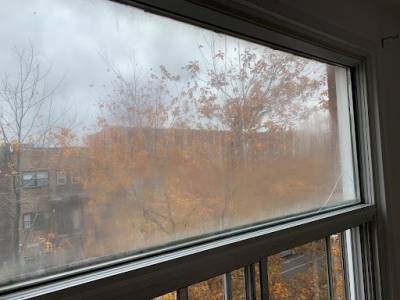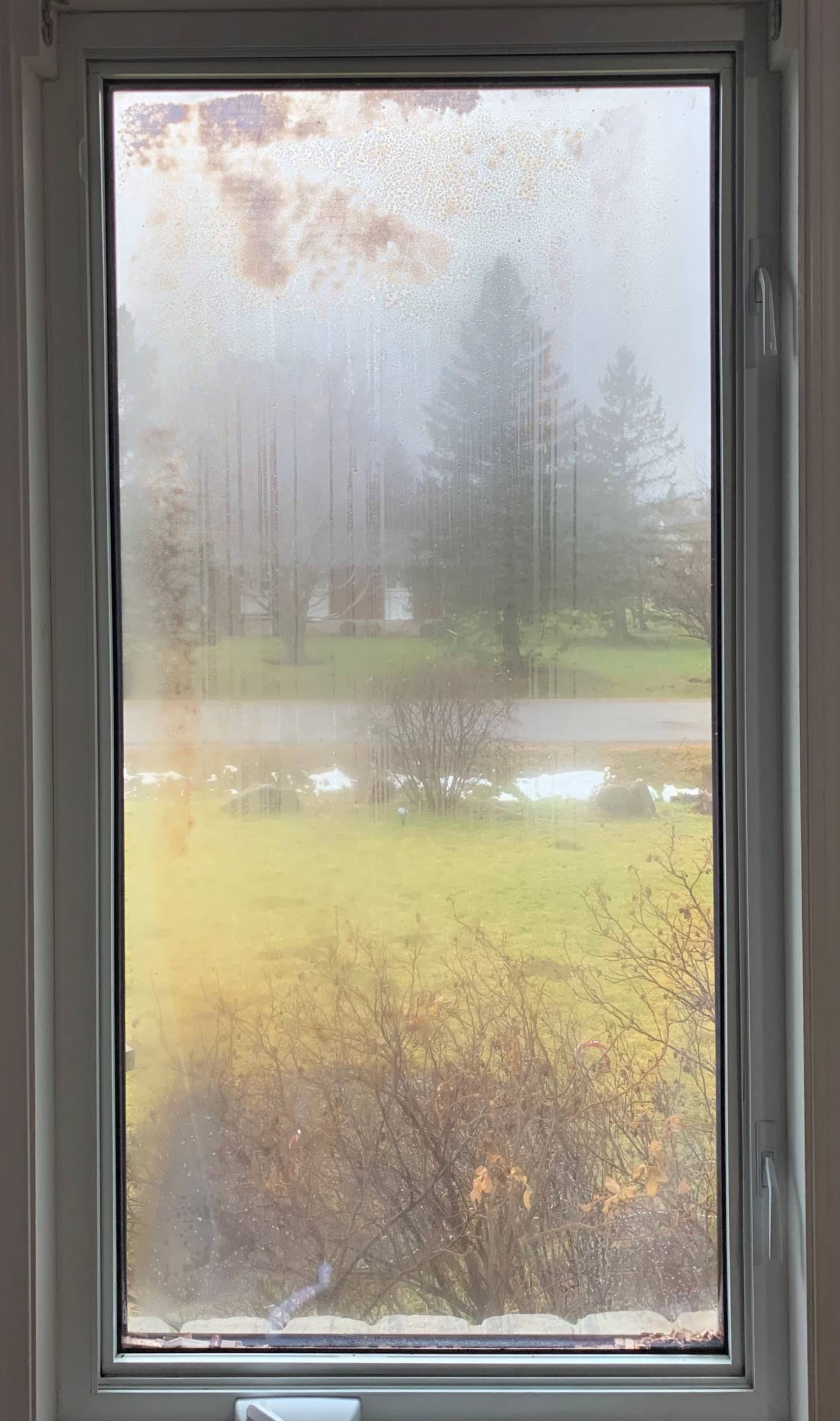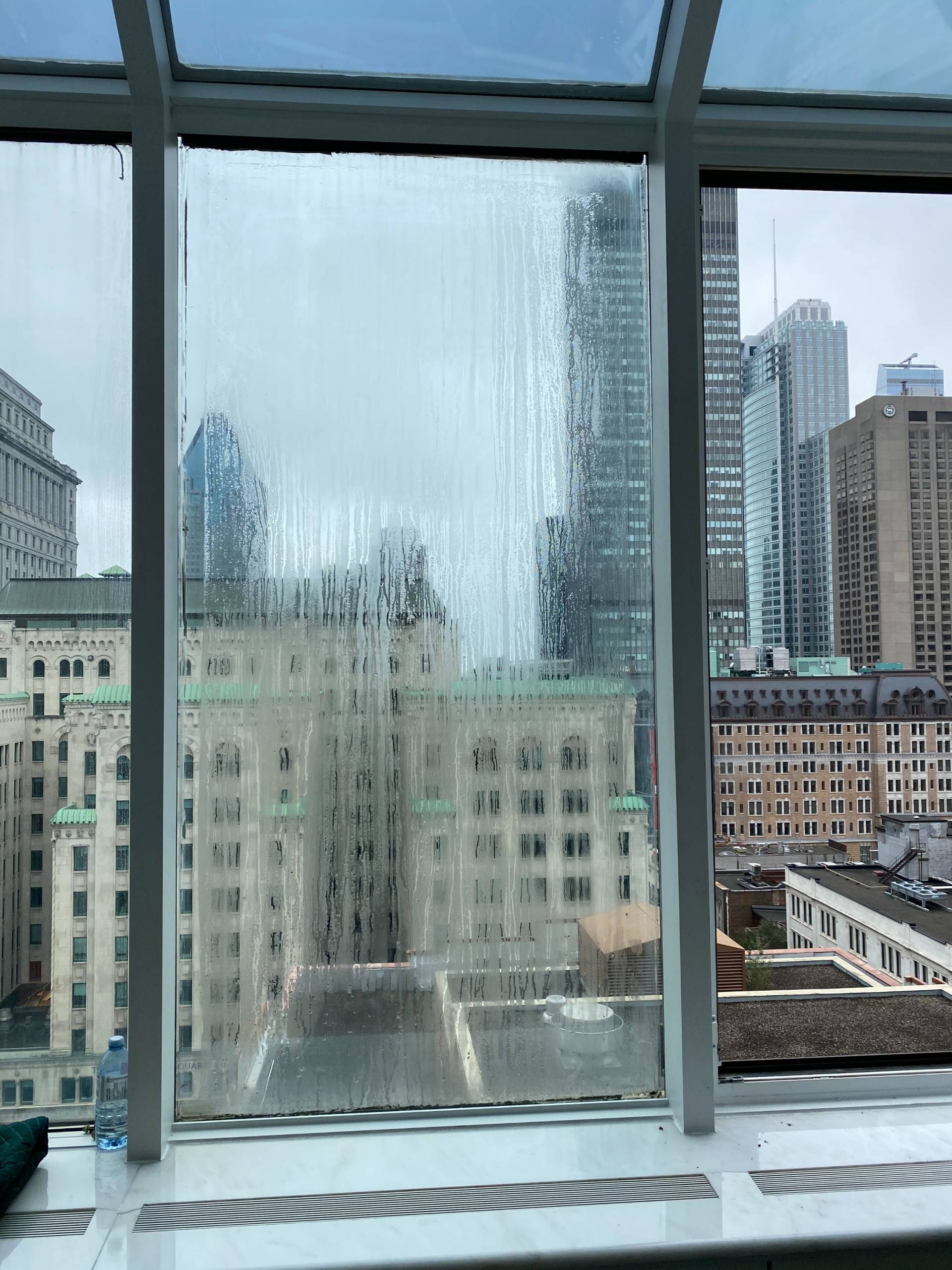
Demystifying window problems can prove beneficial, especially since their purpose is to provide us with a clear view of the outside world while protecting us from external elements. However, over time, various problems can arise, such as fogging or the appearance of stains, just to name a few.
In this blog, we will explore the four most common window problems by unveiling their underlying causes and ways to solve them. Whether you are a long-time homeowner or a new one, these invaluable tips will help you better understand and address the underlying problems related to your windows.
Problem #1: Fogging Between the Thermal Panes

A fine mist suddenly appears between the thermal panes of your windows. This seemingly strange phenomenon is actually quite common, especially affecting windows that are 10 to 15 years old.
The key to this puzzle lies discreetly between the glass panes of your windows: the spacer bar. The spacer contains silica, a component that preserves the clarity of your windows. However, over time, silica accumulates moisture from the surrounding air.
Once the silica is saturated beyond its capacity, it releases moisture in the form of mist between the glass panes. The sudden appearance of a cloud-like mist alters the once crystal-clear view you valued. Fortunately, two great solutions to this problem exist: you can either replace your misty sealed unit or simply defog it. These two techniques allow you to restore your windows like new without having to replace them entirely.
These simple and affordable solutions will not only restore your windows to their former clarity but will also spare you the hassle of planning major renovations and demolition work.
Problem #2: Pink and/or White Spotting on Windows

Have you ever noticed pink or white spots on your sealed window units? These distinctive marks are mainly visible from the outside and often indicate a more complex problem. When such spots appear, it usually indicates that the solar film inside a sealed unit has been damaged due to prolonged exposure to sunlight.
Just as car paint fades and degrades under UV exposure, thermal glass panes are not immune to the harmful effects of the sun. After around 15 years of exposure, glass can show permanent damage. These spots usually occur on the sides of a house that receive the most sunlight throughout the day.
It's important to note that this phenomenon is mainly observed in sealed units equipped with a solar film that has been glued from the inside (a technique in practice for more than 15 years). However, this type of product is gradually losing popularity and making way for more innovative solutions in today’s market.
Once these spots appear, there is no way to remove them, and the problem will unfortunately worsen over time. The only viable solution is to replace the stained sealed units. However, replacing your thermal panes is a cost-effective option compared to completely replacing your windows. Additionally, this intervention doesn't require major renovations or demolition work.
Problem #3: Condensation on Window Surfaces

The presence of heavy fogging (or condensation) on window surfaces, especially from inside your home, is a phenomenon that worries many homeowners. Often, it is mistakenly believed that the problem lies with the thermal panes themselves when the actual cause is that the indoor humidity level is simply too high and needs better control.
Moisture management is necessary in maintaining a healthy indoor environment and preventing problems such as mold growth. A study from Journal of Fungi highlights the impacts of temperature versus relative humidity within indoor environments: and suggests that humidity plays a greater role in preventing mold growth.
Therefore, it is important to recognize that although modern houses are better insulated than older houses, they also need to breathe. Adequate ventilation is essential to prevent the accumulation of moisture and condensation on windows. Here are some recommendations to prevent condensation:
1. Ensure the adequate ventilation of your home.
2. Control the humidity level with an air exchanger and replace the filter as needed.
3. On sunny days, slightly open your windows.
4. During the day, leave blinds and curtains open to allow moisture to evaporate.
5. Monitor the humidity level of your home. Ideally, it should be around 50% in the summer and 30% in the winter, although this may vary depending on outdoor conditions.
Important fact: at Basco Windows & Doors, we understand the importance of choosing the right type of glazing to help prevent this kind of problem. Our sealed units are made of energy-efficient Low-E glass (with Argon gas injection) and are specially designed to provide better resistance to temperature and humidity variations. Therefore, homeowners can enjoy optimal comfort, while minimizing the risk of condensation on their windows.
Problem #4: Thermal Breakage

Winter brings its share of challenges for homeowners, and one of the most common problems is thermal breakage of sealed units. It is not unusual to receive calls from concerned customers whose thermal panes have suddenly cracked, especially during extremely cold weather with outside temperatures dropping as low as -30°C. This type of occurrence is explained by the fact that sealed units are subject to considerable temperature variations.
Here are some great tips on how to avoid this problem and help extend the life of your sealed units:
1. Optimize air circulation: In the fall, remove screens from your windows to allow better air circulation near the glazing, reducing the risk of condensation.
2. Ventilate your rooms regularly: Whether you have curtains or blinds, remember to open them frequently to allow air to circulate freely.
3. Manage the humidity level during daily activities: Whether cooking meals (by using the range hood) or after showering (by activating the bathroom fan), it is crucial to evacuate excess moisture.
4. Ventilate your home: Even in the winter, open your windows daily for a few minutes, to help renew indoor air and wick away moisture.
5. Use suitable appliances: A dehumidifier can prove useful in the basement during the wet seasons. In winter, rely on the setting panel (technical information) of your air exchanger and/or humidifier to balance the humidity level of your home, according to the current exterior temperature.
If you have damaged windows due to thermal breakage, at Basco Windows & Doors we offer window repair services. We can simply replace your windows' glass panes, providing an economical, ecological, and efficient alternative to replacing your entire windows.